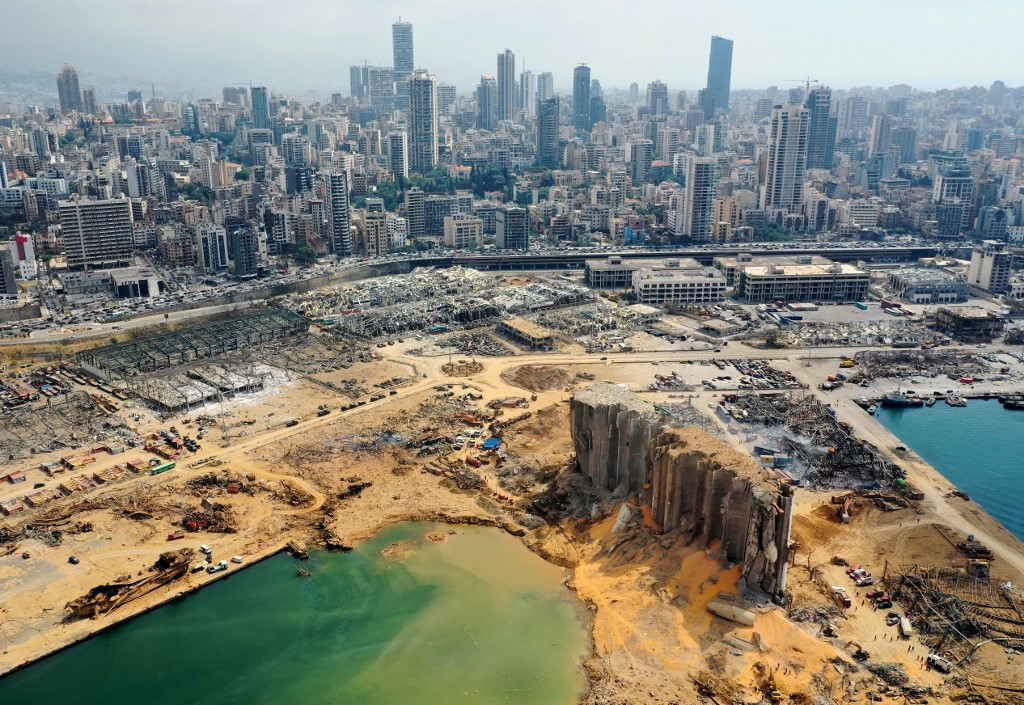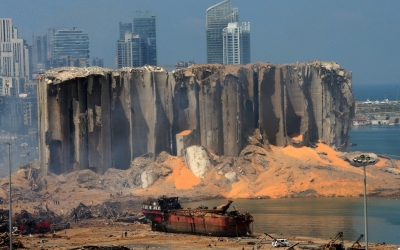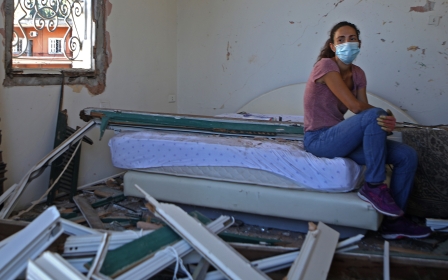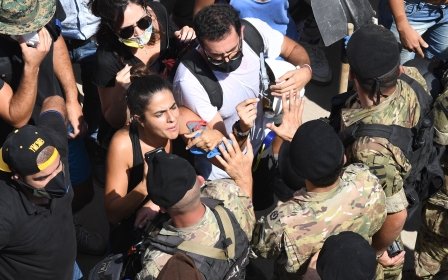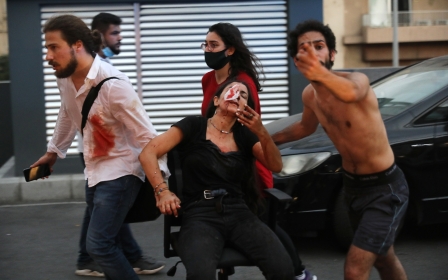Beirut explosion: All we have left is rage - now it's revolution or death

They blew up Beirut, and with it, our hearts.
Beirut has been transforming at a fast rate lately; it was already sad and tired. It has been heartbreaking and enraging to see our beloved city change - how our lives were no longer what we wanted or what we knew, how exhausted people were, how they lost their jobs and incomes, how misery became our only fate.
It was already unbelievable that we had to deal with financial freefall caused by mafia rule, on top of a counter-revolution and a crackdown on opposition, all intensified by the coronavirus pandemic, with the country’s infrastructure and medical capacities depleted.
Our revolution did not fail; it was halted. Our houses did not fall down; they were destroyed. Our lives did not end; we were killed
We had been living with no electricity, shortages of bread and fuel, and no dollars or visas to get us out of this hell. We had been living in hell already. We had lost trust; we probably never had trust, but we started to feel that we had also lost hope after the big promises of the October uprising and the sense of defeat that followed. But that was all before the blast.
With the 4 August blast, everything was multiplied by a zillion. What has happened to us in Lebanon is not an “accident”, and it is not “unfortunate”. Describing our lives as a series of misfortunes is infuriating. Removing responsibility from the criminals who stole not only our present, but also our past and our future, is insulting.
New MEE newsletter: Jerusalem Dispatch
Sign up to get the latest insights and analysis on Israel-Palestine, alongside Turkey Unpacked and other MEE newsletters
Our money did not evaporate; it was stolen. Our revolution did not fail; it was halted. Our houses did not fall down; they were destroyed. Our lives did not end; we were killed. These are not accidents. These are crimes.
They are deliberate and calculated crimes. The 4 August explosion was a massive crime against humanity, and yet it took the government almost a week to resign. Early parliamentary elections are emerging as the most probable scenario, but any elections without serious structural transformations in the system are unlikely to lead to anything more than cosmetic changes - and will probably reproduce many of the very same rulers responsible for the Beirut blast.
Next to death
For more than six years, death was sitting next to us, in our port: our main lifeline for exports that we heavily rely on to survive. How ironic is it to think that our main lifeline was also the home of our ugliest death?
Since 2013, a total of 2,750 tonnes of ammonium nitrate had been accommodated at our port by the criminal mafia state that rules our lives. For all those years, death was our neighbour, but we did not know. Our politicians knew about the explosives at the port, but no one did anything to protect us.
They had more than six years to sort it out, but instead of making this a top priority, they were busy thinking about how they could profit from it and from everything else around them. They knew the catastrophe that could result from these explosives; they had been warned several times, but negligence was their motto. This is not “unfortunate”; this is enraging.
I have lived through more than a dozen explosions in Beirut. They were all horrible and traumatic, but nothing like what we lived on 4 August. Its magnitude was unbelievable. I still cannot believe that we survived. For seconds, we saw death; the earth trembled under our feet and the skies fell on our heads.
There was blood, broken glass, dust and screaming people everywhere. People ran in all directions, with open wounds and looking for their loved ones. Hospitals filled up within minutes. No one understood what had happened. When I saw a news alert saying the blast was the result of an explosion involving fireworks stored at the port of Beirut, it felt like a dystopian Hollywood movie.
Zombie state
Since the explosion, we have lost our memories, our streets, our homes, our lives, our hope, our ability to breathe without inhaling toxic chemicals, and our ability to enjoy a moment of silence without our ears buzzing and the sound of broken glass haunting us. More importantly, we have lost our ability to believe that we have “hit rock bottom”.
This mafia - every single one of them who has been in a position of power for the past three decades - is directly responsible for the destruction of Beirut and of our lives. They are responsible for making this country hell. They destroyed it; they dealt with our lives as though we were disposable, creating a zombie state with no accountability and no basic safety. They emptied state institutions of any meaningful power, and created an alternative mafia system that is ready to kill anyone for it to survive.
What they did is nothing short of a crime against humanity. We have only the sea and the grain silos at the port to thank for absorbing so much of the explosion. If not for those, no one would have likely remained alive to tell of what happened.
With the explosion, we lost everything. We have only our rage left, and this time it is a zero-sum game: Either we survive and put an end to this ruling mafia, or they survive and kill all of us.
After blowing us up and burning down our city, officials announced a state of emergency and Beirut was put under military rule. A day later, protesters in central Beirut were met with heavy repression, tear gas and rubber bullets targeting protesters’ eyes - yet again.
This story has no end yet. The streets will explode again, but this time it will be either a full-blown war or a full-blown revolution. If a massive explosion of this scale does not lead to radical change in Lebanon, nothing else will. If we let this pass without accountability and serious political transition, we will have signed our death warrant.
As talk emerges of early elections, it is crucial that we demand the banning of all parties and politicians who have been in any position of power since the 1990 Taif accords from participating in political life after 4 August. The very basis of the neoliberal sectarian power-sharing system must end, before we can start talking about a democratic transition through elections in Lebanon.
Let our rage guide the coming days. Beirut and all its residents deserve so much better.
The views expressed in this article belong to the author and do not necessarily reflect the editorial policy of Middle East Eye.
Middle East Eye delivers independent and unrivalled coverage and analysis of the Middle East, North Africa and beyond. To learn more about republishing this content and the associated fees, please fill out this form. More about MEE can be found here.



